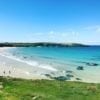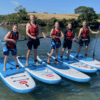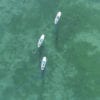This page will give five water safety tips, which could really prove crucial in keeping you, your friends and family safe when having a holiday at any coastal destination.
Some beaches are inherently more dangerous than others and this can be down to a variety of different factors such as the direction the beach faces in to the swell, hazards at different tidal stages such as rocks, rip currents, water quality, whether the beach is lifeguarded and also the amount of people using the beach and playing in the surf. We consider beach safety of paramount importance!
Rest assured Harlyn bay is one of, if not the safest beach on the North Cornish coast and this was a very important factor when deciding where to base our surf school up all those years ago. Harlyn has very few rip currents and is safe to use throughout the tidal range and as well as surfing it is perfect for swimming, bodyboarding, kayaking and paddleboarding.
The beach is lifeguarded from Easter to the end of September and during the October half term. Harlyn has beautiful golden yellow sand and a variety of rockpools and has toilet and refreshment facilities.
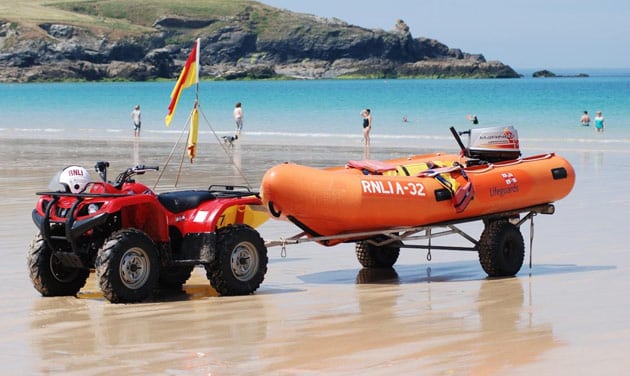
5 Water Safety Tips Everyone Should Know
The oceans power is not something one should take lightly. According to the RNLI 26 people have died on the Cornish coast during August over the past five years, which clearly illustrates the ocean is not to be underestimated.
1. Respect your lifeguards
Lifeguards are the guardians of the beach, they are there to help and educate the general public about the dangers of the sea. Whether you have lived near the ocean your whole life or it is the first time you have ever visited the beach the lifeguards advice should be well heeded. Always use a lifeguarded beach.
Simple rules of a guarded beach include:
Understand the flag system
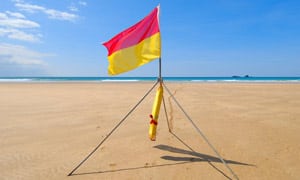
Red and Yellow flags are for swimmers and bodyboarders and this is an area that lifeguards deem to be safe to use. Stay between the flags if you are swimming or bodyboarding.
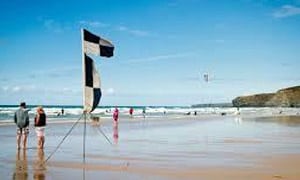
Black and White chequered flags are for surfers and hardcraft. Lifeguards need to separate swimmers from surfers to prevent any collisions.

Never enter the water if you see a red flag flying – this means danger and the lifeguards consider it too dangerous for themselves to perform a rescue without getting in to trouble.
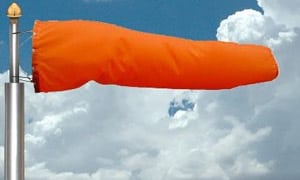
This indicates that there is a strong offshore wind. When the orange windsock is flying it means no inflatables must be used as it could blow them out to sea.
2. Never swim alone
It is essential that you are supervised or with someone when entering the water, and if you are going in alone that you make a friend, member of family or lifeguard aware of this. In doing so you are ensuring that you have someone to prevent you from danger or ensure that someone is there to take care of you or get help if you do end up in danger.
Drowning happens quickly and can happen as a result of even a few seconds of inattention, so the having constant supervision or company will significantly reduce the risk of this very serious and fatal occurrence.
3. Avoid the Rocks!
Surrounding most beaches are coastal rocks and cliffs. These can be a serious hazard and can lead to serious injuries or even fatalities. It is best to avoid these areas and be aware of fast moving tides that may leave you stranded. Consult the lifeguards before venturing off outside of the patrolled areas.
4. Beware of rip currents
Rip currents are powerful narrow bands of water that flow quickly away from the sea and can drag you out very fast. Waves break on the sandbank and the water then drains away from the shallow sandy area into deeper water.
Learning to identify a rip current is important. However, if you do find yourself in a rip current it is important to remain calm and immediately signal/shout for help. After you have done this try swimming across to the nearest breaking wave and if this does not work, reserve your energy and wait for the Lifeguards to come and rescue you.
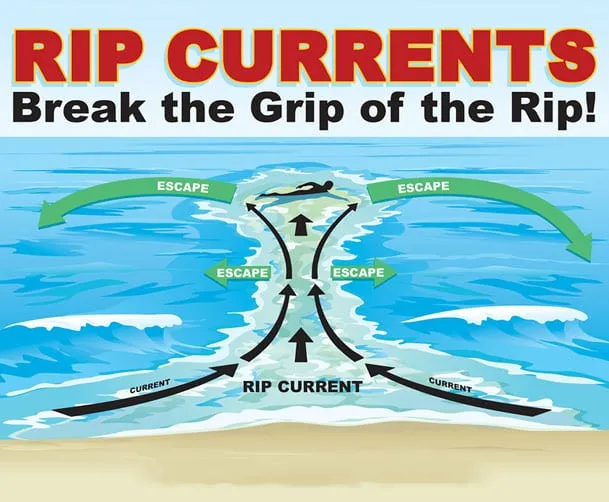
5. Respect other water users, your environment and yourself
The beaches these days can be very busy during high season. It is important to have a respect towards fellow beach users and to leave the beach as you found it. Take away all your litter or dispose it in the bins provided. Never put a disposable BBQ in a plastic bin – used the special ones provided. Finally the sun is a powerful energy source and remember to use suncream and stay out of the sun during the middle of the day. Cover up and seek shade and drink plenty of water.



